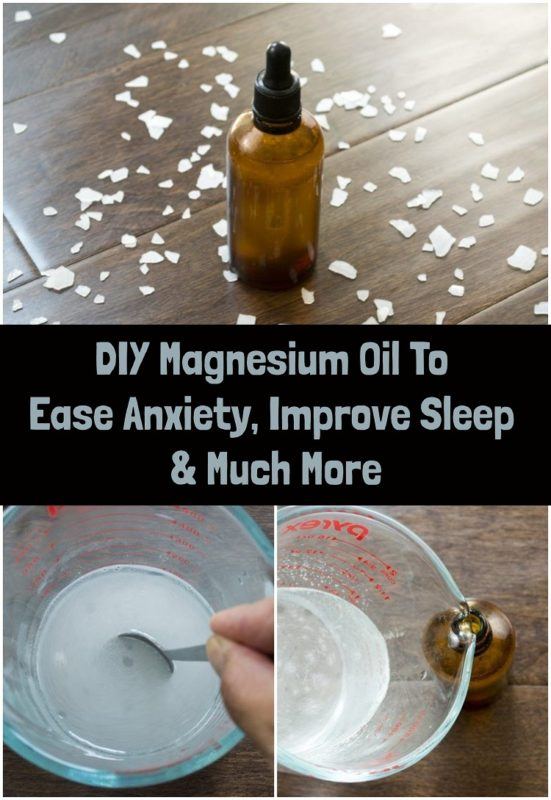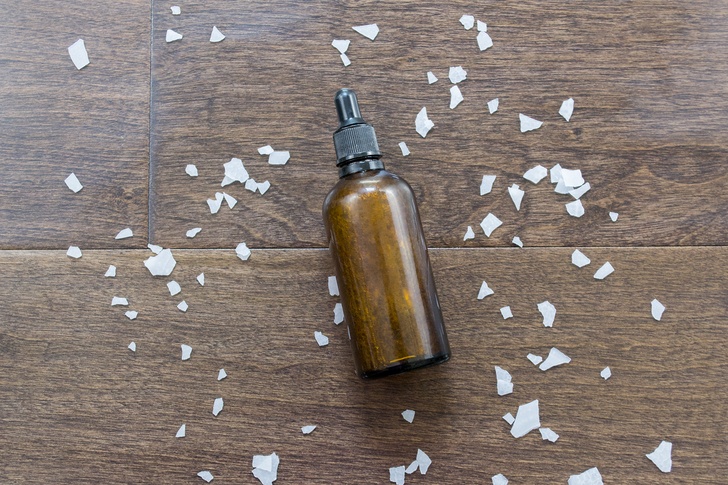
Magnesium is an important element needed by our bodies, yet most people have no idea they suffer from a magnesium deficiency.
Magnesium helps the body regulate calcium, potassium, and sodium. Here are some of the vital roles this mineral plays in our bodies:
- It’s a cofactor for more than 300 enzyme reactions in your body
- It helps relaxation of muscles and will help ease muscle cramps
- Helps stabilize blood sugar and insulin sensitivity
- Vital for cardiovascular health
- Helps to balance hormones for both men and women
- Increased stress causes the body to burn through magnesium, so it needs to be replenished
- Helps mood regulation
What is Magnesium Oil?
Technically, it’s not an oil. It just feels slippery like oil. It’s a solution of magnesium chloride flakes in water.
You can buy it pre-made (this Ancient Minerals Magnesium Oil Spray is the best), but it’s much more cost effective to make our own.
Yes, there are magnesium supplements you can take orally, but magnesium supplementation is better for you in an absorbable form.
Your body will only take what it needs through the skin, whereas taking some supplements orally can cause an over-abundance in the body. And, again, this method is more economical than buying pill supplements.
10 Benefits of Topical Magnesium Oil
Widespread acknowledgment of the lack of magnesium in American diets has made it one of the most important supplements to take.
This mineral is one of seven nutrients on the U.S. Department of Health’s list of nutrients of concern, published as a part of its Dietary Guidelines for Americans, and according to the World Health Organization, it’s been estimated that three-quarters of adults aren’t getting enough magnesium in their diet.
A study by scientists at the Centers for Disease Control, published in the Journal of Nutrition, explained, “Despite the role of magnesium in maintaining health, much of the U.S. population has historically not consumed adequate amounts of magnesium…Magnesium is an essential element that is crucial to hundreds of physiologic processes in humans. Not surprisingly, inadequate intake of magnesium has been linked to various adverse health outcomes, including the development of cardiovascular disease, hypertension, diabetes mellitus, and headaches. Furthermore, magnesium is important in bone growth and may play a role in athletic performance.”
So, why don’t we just eat more kale, walnuts, and other magnesium-rich foods?
It seems that no matter how much of these foods we can consume, this mineral isn’t best absorbed orally. When magnesium is taken orally, it’s affected by a number of elements in the gut, and it can also act as a laxative, which decreases the amount of time it can be absorbed in the body.
In the past, we got quite a bit of magnesium through the foods we ate, especially those dark veggies, and certain types of nuts, but our soil worldwide – particularly in the U.S., has become dramatically depleted in magnesium. For example, spinach is said to contain just 13 percent of the magnesium that it did back in 1950, so even if you eat a ton of Popeye’s favorite food, you’re probably not getting enough.
Ancient people actually used magnesium for various topical and transdermal therapies, without the scientific knowledge behind it.
They used it for mud packs, in steam and sweat lodges, mineral baths and herbal compresses – and today, we know why: this type of topical therapy can be incredibly healing to promote better health and wellness.
These are just some of the benefits of using magnesium oil topically.
1. Joint & Muscle Pain Relief
One of the primary uses of topical magnesium oil is pain relief. The oil is a natural muscle relaxant, and by applying it to sore muscles and joints it can reduce pain. Scientific studies, including research published in The Journal of Physiology as reported by Dr. Oz, found that it helps to calm a chemical known as NDMA, which when stimulated, triggers pain. In addition to sore muscles and joints, applying magnesium oil can also bring relief to problems like carpal tunnel syndrome, tendonitis, and localized back pain.
2. Battling a Migraine
A lack of magnesium is a common factor in migraines. Research has found that those who suffer from migraines and other severe headaches were magnesium deficient, but by treating the deficiency, the pain was alleviated. The best way to get more magnesium to treat your migraines is to apply the oil directly onto your skin. You can use a spritzer and then spray it onto the bottoms of your feet, the palms of your hands and your stomach. Aim to do this twice each day, once in the morning and once just before bed, as well as any time you feel a migraine coming on.
3. Improve Your Complexion
Research into the various uses of magnesium oil has found that it can break apart different oils and fats, which can help reduce oiliness of the skin, preventing or limiting acne breakouts, and even conditions like rosacea and eczema.
4. Better Sleep
As magnesium is an effective natural muscle relaxant, that may be why it’s so outstanding for addressing sleep problems. Experts have found in studies, including 2009 research from the Medical University of Lublin in Poland, showed that it helps one sleep due to its ability to relax GABA receptors in the brain and the nervous system, promoting a sense of calm and virtually slowing down the mind and body so that you can relax enough to fall asleep.
5. Relieving PMS Symptoms
We know that magnesium oil can help with pain, so it makes sense that it can also help with the pain and other symptoms that come with PMS. Research has confirmed this, including a June 1995 study published in Townsend Letter for Doctors, which revealed that 95 percent of women tested experienced less breast pain as well as less weight gain just before their periods when they used a magnesium supplement.
6. Improving Overall Well-Being & Providing Stress Relief
Another reason applying magnesium oil may help with PMS, as it offers stress relief and can improve general well-being. Magnesium is usually eliminated through urine under times of stress, and as it helps several physiological and neurological processes when the body is stressed, maintaining a sufficient level by using it topically can help hormones balance naturally. Magnesium also acts as a major anti-anxiety agent, so much so that it’s been called the “original chill pill,” it helps to calm the nerves throughout our body, including in the brain.
7. Controlling Hypertension
Supplementing with magnesium has also been found to slightly lower blood pressure in those suffering from hypertension, with a number of studies coming to that conclusion, including 2012 research out of the U.K.
8. Regulating Diabetes
When diabetes is left uncontrolled or is poorly controlled, it leads to a significant excretion of glucose in the urine which depletes magnesium levels in the body and has major implications when it comes to insulin resistance. That makes supplementing with magnesium even more important for those who need to control diabetes.
9. Better Oral Health
Magnesium is a key factor in the body’s ability to successfully absorb calcium, which means when you don’t get enough, you don’t get the calcium you need and your teeth and bones can suffer.
10. A Natural Deodorant
Magnesium oil has been found to minimize perspiration odor – add a couple of drops of essential oil like lavender and you’ve got the perfect natural deodorant.
How To Make Your Own Magnesium Oil
Take a look at our quick 45 second video and then continue below for full ingredients, materials and instructions.
Ingredients
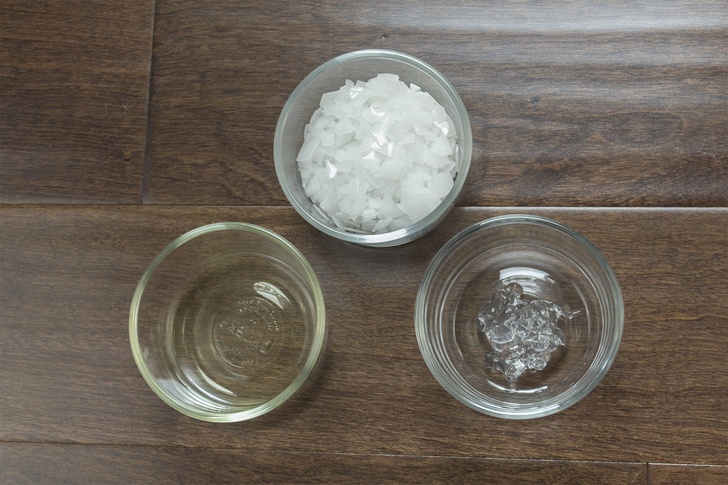
- 1/2 cup magnesium chloride flakes
- 1/2 cup distilled water
- 1 tbsp organic aloe gel (optional)
- glass measuring cup
- glass spray bottle or dropper bottle
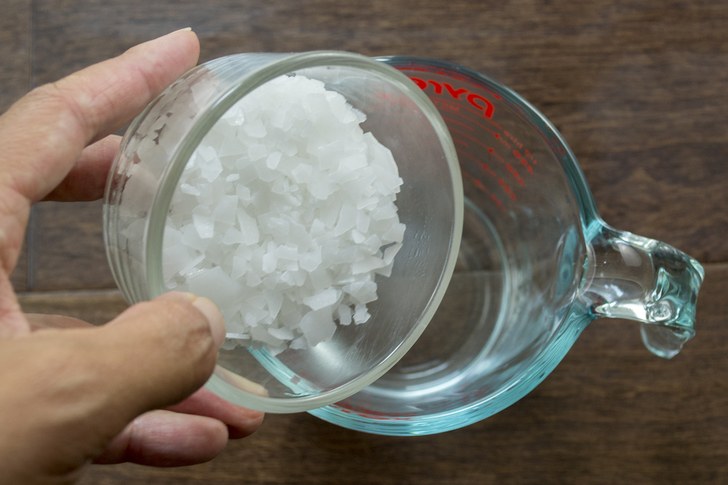
Bring the 1/2 cup of distilled water to boil in a non-aluminum pan. Pour the hot water into a glass measuring cup. Add the 1/2 cup magnesium chloride flakes to the hot water.
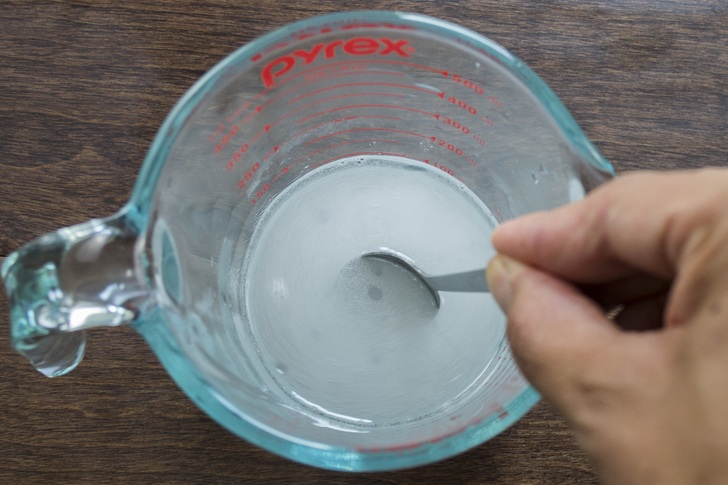
Add the aloe and stir until the magnesium flakes are dissolved.
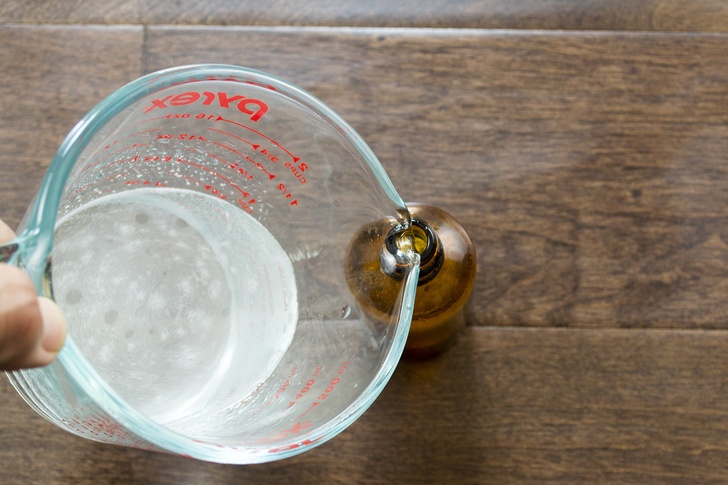
Pour into a glass jar. Add the spray or dropper lid and store in s cool place out of direct sunlight.
How to Use Magnesium Oil

Spray (or use the dropper to drop) on arms, legs, and stomach daily. It will tingle when you apply it initially—this is normal. It should eventually fade. If your skin is sensitive to the sensation, dilute with distilled water. Try to avoid areas of your body with thinner skin (elbows, behind the knees, neck), they will be more sensitized to the tingling sensation.
DO NOT apply the oil to freshly shaved areas—it will hurt. Wait at least 12 hours post-shave application. If you dry brush your skin, it will be more sensitive to the oil as well. Wait until the next day to apply. After your body absorbs as much as the magnesium as it needs, you may notice a slight white film or powder on the skin. You can wipe or rinse it off. Once applied, wait at least 30 minutes before showering or bathing to ensure that the magnesium gets absorb and doesn’t get rinsed off.
Don’t want to make your own but want to experience the benefits of magnesium oil? Try this Ancient Minerals Magnesium Oil Spray.
Pin This To Save For Later
